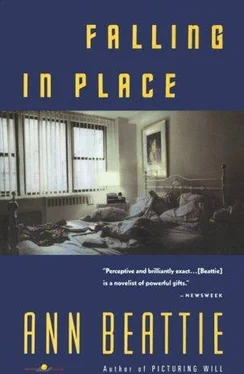Ann Beattie - Falling in Place
Здесь есть возможность читать онлайн «Ann Beattie - Falling in Place» весь текст электронной книги совершенно бесплатно (целиком полную версию без сокращений). В некоторых случаях можно слушать аудио, скачать через торрент в формате fb2 и присутствует краткое содержание. Год выпуска: 1991, Издательство: Vintage, Жанр: Современная проза, на английском языке. Описание произведения, (предисловие) а так же отзывы посетителей доступны на портале библиотеки ЛибКат.
- Название:Falling in Place
- Автор:
- Издательство:Vintage
- Жанр:
- Год:1991
- ISBN:нет данных
- Рейтинг книги:4 / 5. Голосов: 1
-
Избранное:Добавить в избранное
- Отзывы:
-
Ваша оценка:
- 80
- 1
- 2
- 3
- 4
- 5
Falling in Place: краткое содержание, описание и аннотация
Предлагаем к чтению аннотацию, описание, краткое содержание или предисловие (зависит от того, что написал сам автор книги «Falling in Place»). Если вы не нашли необходимую информацию о книге — напишите в комментариях, мы постараемся отыскать её.
Falling in Place — читать онлайн бесплатно полную книгу (весь текст) целиком
Ниже представлен текст книги, разбитый по страницам. Система сохранения места последней прочитанной страницы, позволяет с удобством читать онлайн бесплатно книгу «Falling in Place», без необходимости каждый раз заново искать на чём Вы остановились. Поставьте закладку, и сможете в любой момент перейти на страницу, на которой закончили чтение.
Интервал:
Закладка:
The telephone rang, and she took a final swallow of Tab before she got up to answer it.
“Hello, Sunbeam,” her father said. “How was school?”
“Suck-o,” she said.
“You could at least say something pleasant before you’re foul-mouthed. If you have to be foul-mouthed.”
“You’d be too, if you had to sit there and listen to her giving a dramatic reading of Vanity Fair .”
“Never read that one.”
“She probably didn’t either, and that’s why she was reading it out loud.”
“If you’re so smart, how come you flunked English?”
“Because you can only be smart in so many things. Like, I’m really good at knowing how many rows of beans Jack can plant in his garden if his garden is in the shape of a parallelogram and I know the lengths of two sides.”
“The reason I called,” he said, “is because when your mother called the house during her break there was no answer. She wanted me to ask you to put the hamburger meat out to thaw.”
“The retard’s up in the tree, doing his tree frog number. He tried to spit on me and missed.”
“Did he really try to spit on you?”
“Yeah. What are you gonna do — tear off your gray business suit and glasses in the nearest phone booth and fly in from the Big Apple to deck him?”
“I don’t own a gray business suit, and you should try to find a phone booth on a New York street that has a door that closes.”
“Navy blue? What color do you own?”
“A fire-engine-red leisure suit, made of Dacron polyester. You think I’m a total ass or something? A gray business suit. Don’t tell me you’d like it if your dad was the sort who’d button himself into a vest and stick a pocket watch in one pocket and a Hershey’s Kiss for his little princess in the other.”
“You’re so weird. So you wear a sports jacket. You think that’s so different from a suit.”
“My Sunshine Girl,” he said. “Pretty as a berry, sweet as a dream. Suck-o yourself.”
He hung up.
The record ended. She flipped it to the other side. A tiny feather of dust rose off the record and settled on it again. She watched it spin. Too small to cause any problem. She decided not to bother to blow it away.
June. A long time left in summer school, having Lost in the Forest read them things from books at the end of every class. She did it to kill time, probably. She said she was doing it because language was beautiful (crab-claw), and it was very rare that a person knew how to read aloud well. Presumably Lost in the Forest did: She read in whispers and sudden gasps, sometimes slowly, then fast, looking at the book as if there were real movement there, as if characters hardly larger than specks of dust were actually running and quarreling and jumping in the air, while Lost in the Forest stared down at them appreciatively, like God.
There was going to be a true-false test about the first chapter of Tom Jones on Monday. There had already been a test on “The Pardoner’s Tale,” and there was going to be a test at the end of the week on Pride and Prejudice . The first test had been an essay, but Lost in the Forest said that they would not have to write more essays; for what she was being paid, she wouldn’t consider reading twenty of their ill-expressed opinions again. “I’d worry that you’d tell your parents what I said,” Lost in the Forest had told them, “but none of you can communicate clearly enough to get your message across.” She had sniffed. A self-righteous Mary Poppins sniff, but she had neither taken off nor landed. She had stood rooted to the spot, and then she had sighed deeply and fumbled in her book bag and read them a poem about somebody falling out of the sky while some other people worked. Then, gazing up at the globe-shaped light in the classroom ceiling, she had said that they could leave, ten minutes early. Auerberg had looked back at the schoolroom and had called their attention to Lost in the Forest, standing at the window, watching them walk away. The ones who saw her had waved dramatically; Billy had bent over as if he were mooning her; Claude Williams had made circles with his wrist, pretending to lasso her.
She had done nothing in reply. She had just stood there, watching them, hating them, and feeling a little sorry for them, and sorrier for herself. She wished that the sidewalk would sink and they would disappear from her life as easily as when you wave goodbye to company, the elevator door closes and they’re gone. Oh, maybe a second of joking, when the slightly drunken guests push the “Door Open” button to say a final thank you, and the hostess is caught off-guard, looking blank-faced and exhausted. But then gone, taken away, all over. No: They’d be back the next day, and the next. They’d be there all of July, and so would she. And that lunch bag, thank God she had been able to tell by the weight of it that it was not a sandwich and her little bag of raw carrots. Thank God it wasn’t a bomb — that these children were not destructive, just stupid. She had no curiosity about what it was.
“Lost in the Forest, you are such a drag,” Mary said to the empty house. She went upstairs. In her room, she took off the Peter Frampton T-shirt and put it on the bed, unzipped her jeans, took them off and her satin underpants, too (a Christmas present from Angela: an upside-down strawberry ice cream cone painted on them, neon pink melting where her pubic hair began, spattering pink all the way to where the pants curved into her crotch).
She went over to her wall. There were six posters of Peter Frampton, all the same. In the posters, he had his head tilted. His hair was very curly and his mouth was pale. His blue eyes were paler than her own. His skin looked as if it had been photographed through a screen. Up close to the poster, you could see the faint lines of the grid marks.
Mary put her cheek to his, rolled her head until her mouth touched his lips. The paper was smooth and cool. She took her mouth away and said two words: “Peter Frampton.” “Peter” made her mouth open. “Frampton” made her pucker her lips so that ending the word was a kiss. This was Mary’s routine. She did it every day. And every day it was predictable that Peter Frampton would not come to life, that when she said “Peter” and her mouth opened, his tongue would not come into her mouth. No point in hoping against hope for the extraordinary: a small seed exploding into a giant beanstalk; a body falling from the sky. A body falling from the sky?
She had forgotten to put out the hamburger meat.

“Spangle,” Cynthia said. “Tell me that I am not actually seeing what I’m seeing.”
“You’re blind,” he said. “You don’t see anything. Stumble into bed and let your other senses take over.”
“Spangle,” she said, “I can understand that I might have deserved a put-down like this if sending this notice around had been my idea, but I only typed it because the vice-principal told me to. So do you think it was a good idea to draw a little picture of me on the ditto master? Do you think that was funny? Did you think I’d like that?”
“It’s a good drawing. Besides, those money-up-the-ass parents will love it. They’ll think it establishes rapport. You watch: You’ll get yourself invited to a garden party.”
“You’re a real shit. Now I’m going to have to do this thing over.”
“No you won’t. Just tape a piece of paper over the drawing.”
The room was dark except for the frog night light on the table beside the bed. She had left the ditto master on the table when she got undressed and went to take a shower, and Spangle — bored, trying to twirl a Frisbee on his first finger — had picked up the pieceof paper and a pen and doodled Cynthia’s face. It was not a caricature; it was what he thought she really looked like .
Читать дальшеИнтервал:
Закладка:
Похожие книги на «Falling in Place»
Представляем Вашему вниманию похожие книги на «Falling in Place» списком для выбора. Мы отобрали схожую по названию и смыслу литературу в надежде предоставить читателям больше вариантов отыскать новые, интересные, ещё непрочитанные произведения.
Обсуждение, отзывы о книге «Falling in Place» и просто собственные мнения читателей. Оставьте ваши комментарии, напишите, что Вы думаете о произведении, его смысле или главных героях. Укажите что конкретно понравилось, а что нет, и почему Вы так считаете.












